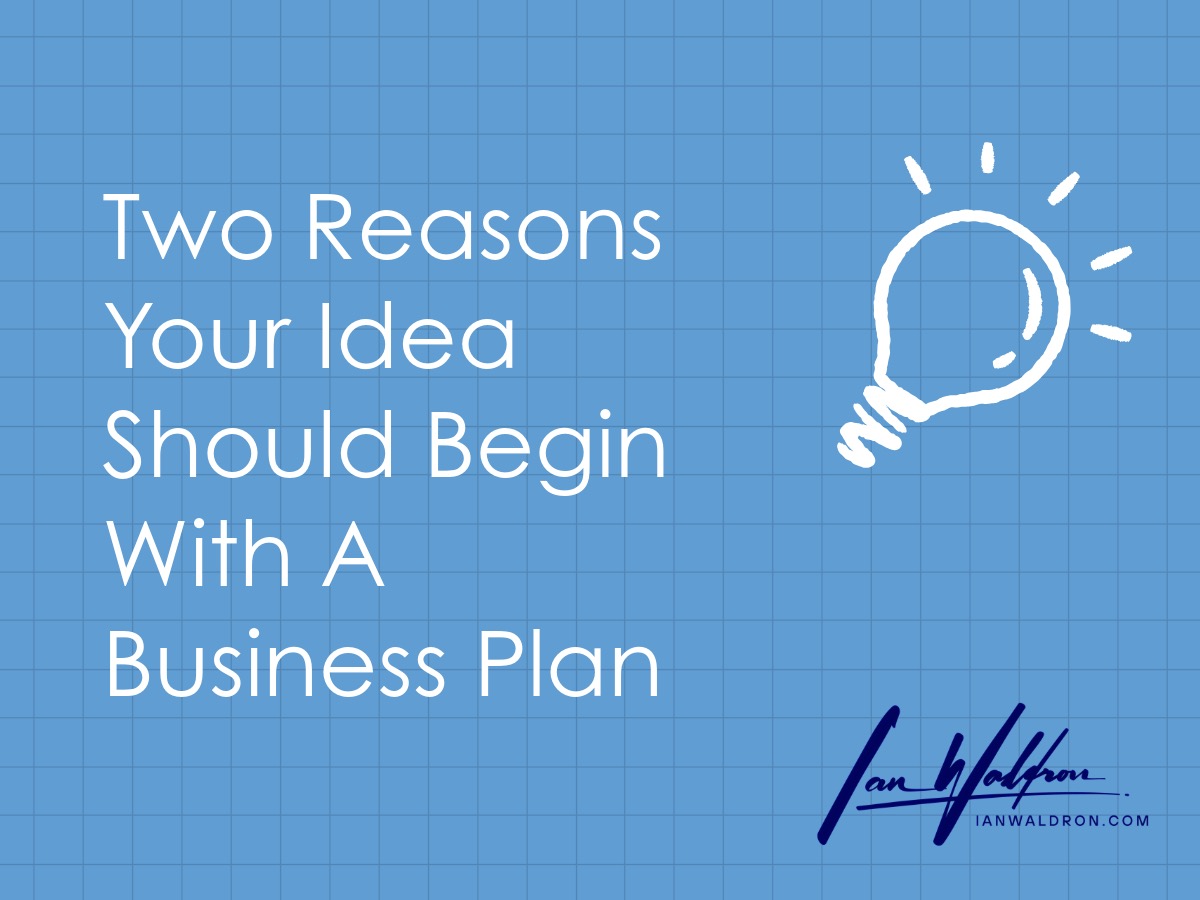
Two Reasons Your Idea Should Begin With A Business Plan
You have an "aha moment." Your excitement is through the roof as you contemplate your new business idea. You begin to visualize all the pieces coming together as well as what your life would be should you have the courage to pursue this idea. And courage it will take.
"There’s no shortage of remarkable ideas, what’s missing is the will to execute them."
-- Seth Godin
Perhaps we could extend this a bit further with "and an operator competent enough to execute them well."
But let's say you possess both will and ability. Before taking the leap, it's incredibly important to recognize that this particular idea sits alongside an infinite number of possible ideas. Each with its own unique ability to capture your imagination and promise of reward.
However, the hidden danger is the opportunity cost that's intrinsic to this process and life itself. You could choose any idea among an infinite set of ideas. But, you can't choose every idea. You'll have to make a choice. And in doing so, you forgo the ability to choose another.
This seems obvious. But in my experience, this is a lesson paid dearly in the most exhaustible of all resources: time.
A Tool To Organize Your Ideas
As alluded to, making the right selection is key. So then how do we make the best choice possible. This is where the business plan comes into play.
I use the business plan as a tool to help determine which ideas to chase and which ones are best left in the drawer. I specifically:
- Organize the idea into a thoughtful plan to determine if the idea is good enough to explore further on its own; and
- Juxtapose the idea amongst others to determine if it's the best idea to select amongst a group of alternatives.
An Idea Must Stand Alone
When I experience the lightbulb moment, I'll look to begin organizing the idea into a concrete plan as early as possible. It's fun to tease an idea for a while before exposing this nascent and beautiful undeveloped thing to scrutiny. But this tends to lead to unnecessary emotional highs and lows. You're liable to become prematurely excited about something only to be let down when you uncover its flaws.
The business plan doesn't need to be overly complex. The Small Business Administration has an article on how to draft a business plan you could follow. However, I find the conventional wisdom surrounding business plans not too actionable.
You'll encounter suggestions like:
- Create an executive summary,
- Describe the company, and
- Define the organizational structure.
That feel's a lot like homework. I'll pass.
You'll also find alternatives like the "lean" or "startup" business plan, which is really a glorified back-of-the-napkin approach. Better, but this still leaves something to be desired.
Here's what I do instead:
- Define the thing (product or service),
- Identify the Total Addressable Market (TAM), and
- Determine what unique stills, resources, etc., I have to execute competently within this theme.
This can, and often is, a single page effort. After completing a rough draft of a business plan, I'll have a sense of whether the particular idea is worth exploring further. And if it's not, it goes in the drawer. I won't dwell on it. Other ideas can and will come.
Just because an idea isn't worth pursuing, it doesn't mean it's deleted from memory. I keep all my business ideas around. Next I'll discuss why.
An Idea Must Rise Above
You have an idea in hand. It survived the first stage of the planning process and appears to be worthwhile. But, is it the best amongst alternatives?
We only have so much time on the Earth to accomplish what we endeavor. The idea of the scarcity of time is how I form the basis of this next analysis.
Reaching back into the drawer of ideas, I pull out business plans that I really liked at the time but otherwise didn't cut the mustard otherwise they'd be more than just ideas today.
Here's why I do this: Human beings are capable of inconsistent preferences. It's possible that you prefer B to A, and C to B, but somehow prefer A to C. If B is better than A, and C is better than B, then you should always prefer C to A. But that's not how we operate.
Because of the human ability to form inconsistent preferences, and within the context of maximizing the scare resource of time, I carefully layout my current plan next others I've previously discarded. If in comparison it becomes clear that an earlier plan I passed on is better than the one in hand, this is good indication I'm not thinking logically, I'm acting emotionally, or some other bias has entered my decision making process.
This provides an opportunity for pause. If this opportunity which I'm quite excited about in the moment is relatively worse than an idea or plan I've had in the past, additional evaluation is needed before moving forward.
Do I throw it out? Not necessarily. Little in life is apples to apples. The flaw may be in the analysis and not in the substance of the actual idea.
Instead, I use the relative assessment to determine the strength of a particular idea.
Final Thoughts
In life, you have to choose. So it stands to reason, making the best choices amongst alternatives will likely lead to a life of greater fulfillment.
A business plan can assist in this process of making choices. A thoughtfully crafted, and decision useful plan will allow you to filter out the noise and focus on what's important. It will allow you to see an ideas strengths and weaknesses and whether it's an idea worth pursing. But, be careful to ensure you're selecting the best idea of those you've come up with to pursue.
Now go on and execute.

